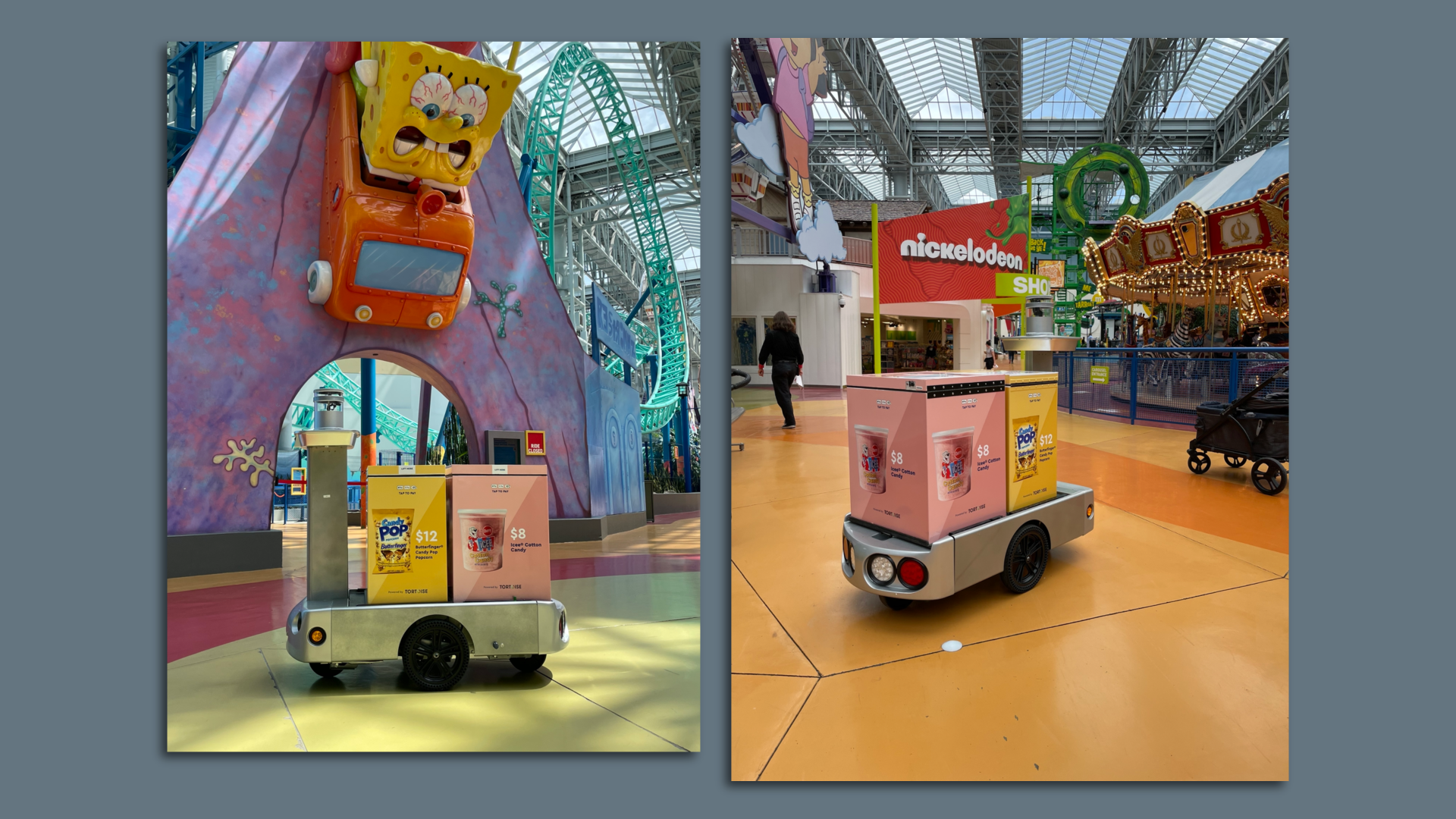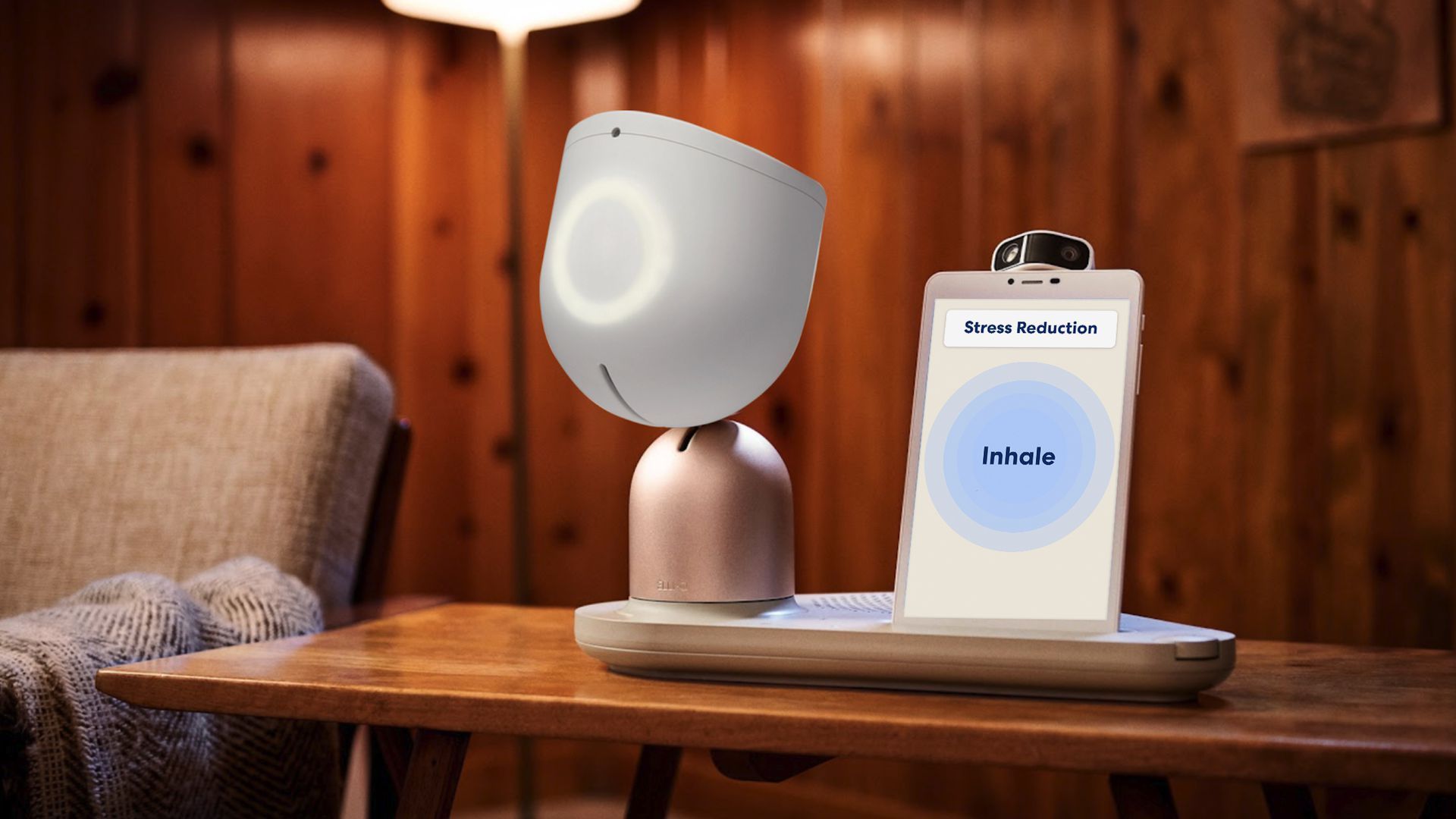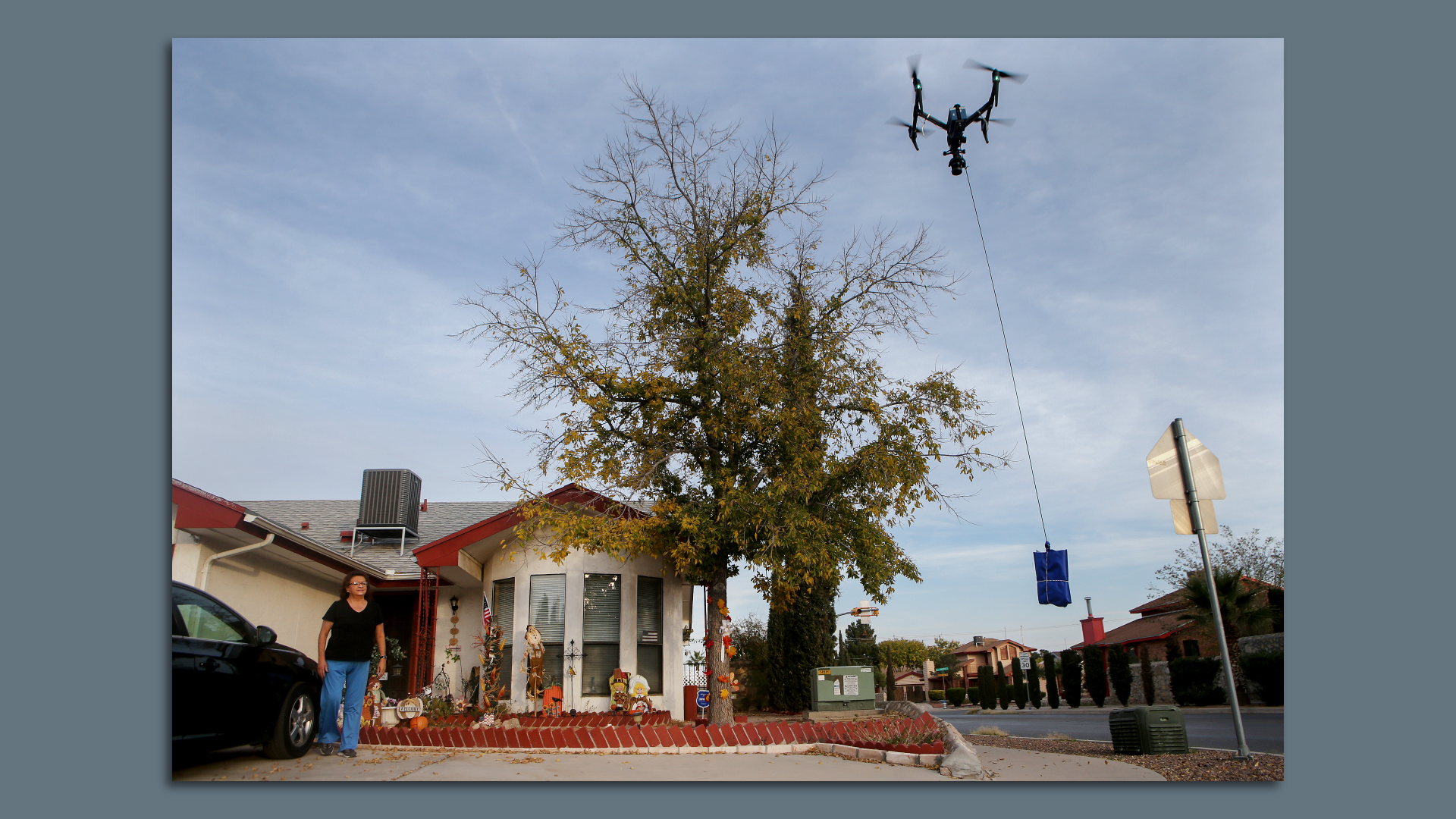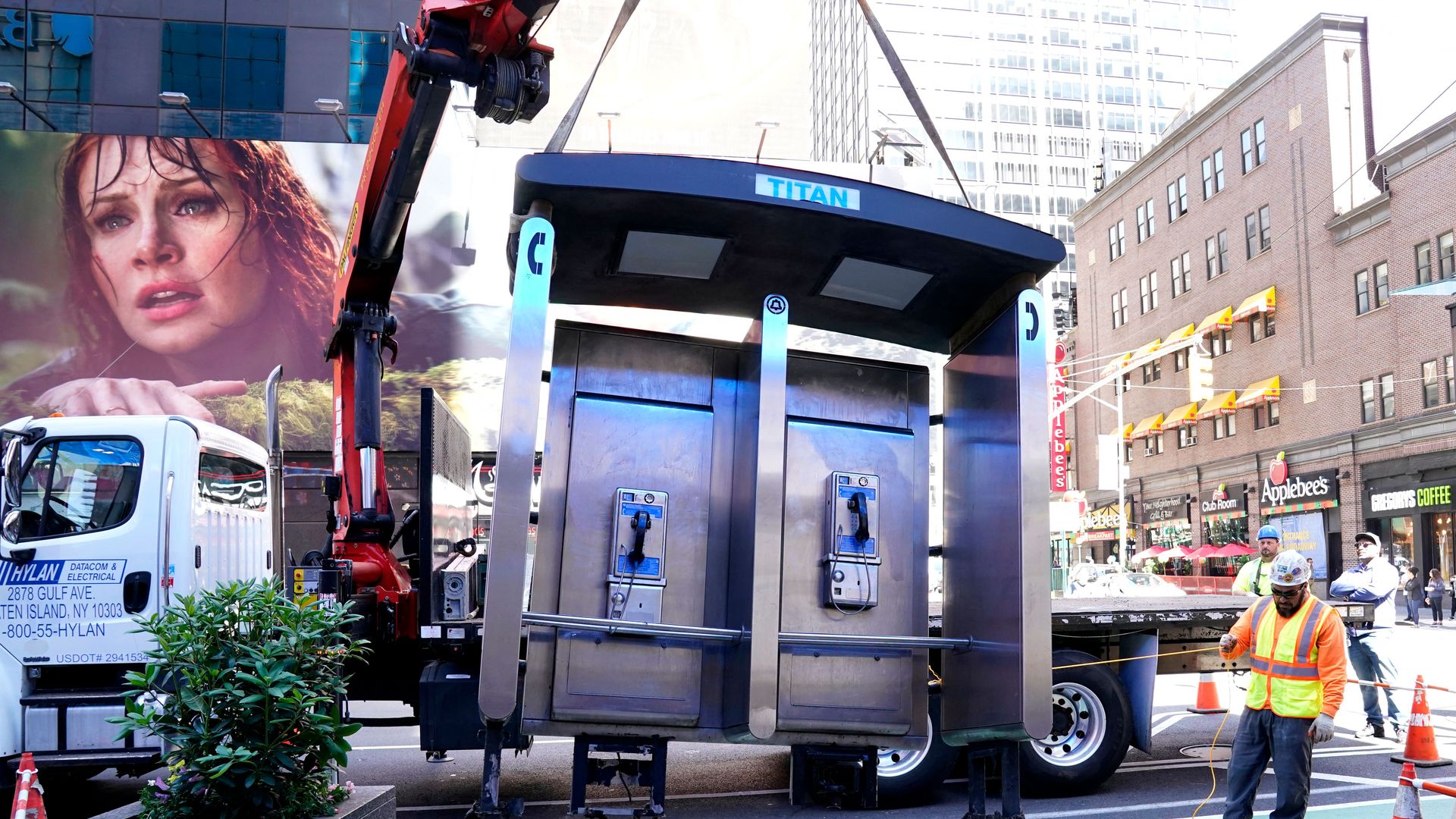| | | | | | | Presented By Robin Powered | | | | Axios What's Next | | By Jennifer A. Kingson, Joann Muller and Alex Fitzpatrick · May 26, 2022 | | Hello there! Alex Fitzpatrick, the new editor of What's Next, here. I just arrived at Axios after almost a decade at TIME, and I'm excited to discover the future with you. - A bit about myself: I'm 33, live in upstate New York, and know far more about Star Trek than most normal people consider healthy.
- I'm eager to hear from you about what you'd like from this newsletter. Drop us a line at whatsnext@axios.com with your thoughts. You can also find me on Twitter at @AlexJamesFitz. Sorry in advance for all the hockey tweets.
One more thing: Join Axios' Sara Kehaulani Goo, Shawna Chen and Niala Boodhoo tomorrow at 12:30 p.m. ET for a virtual event on Asian American visibility and vulnerability. Guests include New York City Council Member Shahana Hanif, climate activist and poet Kathy Jetn̄il-Kijiner, and actor Tamlyn Tomita. Register here. Today's Smart Brevity count: 1,173 words ... 4½ minutes. | | | | | | 1 big thing: Robot stores-on-wheels are making inroads |  | | | Mobile stores roam around the Mall of America. Photo courtesy of Tortoise. | | | | Robot vending machines may be coming soon to a mall, airport or theme park near you, Jennifer A. Kingson writes. Why it matters: While mobile robots may eventually help solve the last-mile home delivery problem, they may first prove their worth as cute onsite sales representatives — earning incremental revenue for companies that deploy them while warming the public to the idea of robotic assistants. Driving the news: Tortoise, which makes what it claims is the first remote-controlled store on wheels, says it's getting big traction from companies that operate sports venues, airline terminals and supermarkets. - Tortoise's remote-controlled robots have been selling concessions at NBA and NHL games, and soon will be launching with MLB and the NFL.
- They're wandering the Mall of America for Nickelodeon, selling popcorn, cotton candy and theme park tickets.
- And they're mingling with office workers at San Francisco's Levi's Plaza, deployed there as an amenity by the development's owner, Jamestown, to lure people back to work.
The robots work well at "any location where you have long lines, a lot of food traffic or a captive audience, or ideally some combination of the three," says Tortoise co-founder Dmitry Shevelenko. How it works: Customers use a credit card to unlock a box on the Tortoise's back and take their chosen product. Each robot is steered and monitored remotely by humans at a Mexico City control center. - The average transaction time is 11 seconds.
- 30% of people make a second purchase right away.
"The first time they try it, it's like, they're almost not even sure what's going to happen," Shevelenko tells Axios. "And then people either buy a second item from the same container or one from each container" on the robot's back. The intrigue: While Tortoise is "very intentionally not doing anything in last mile" deliveries, another robot company, Starship Technologies, which shuttles food on U.S. college campuses, is going full steam ahead. What's next: Both Tortoise and Starship say they're about to unveil partnerships with giant U.S. grocery chains. The former's robots will offer impulse buys to curbside pickup shoppers, while the latter's will make home deliveries. Read the rest. |     | | | | | | 2. Meet grandma's new robot pal |  | | | The ElliQ companion robot. Photo courtesy of Intuition Robotics | | | | New York State is giving hundreds of "companion robots" to seniors at risk of social isolation, The Verge reports. - Named ElliQ, the lamp-esque robots — from Israeli AI firm Intuition Robotics — are designed to make small talk, crack jokes and more.
- ElliQ's "face" pivots toward whomever it's speaking with, lending the bots a disarming, Pixar-like quality.
Why it matters: Researchers have linked social isolation to all sorts of negative health outcomes: Loneliness is associated with a 50% higher risk of dementia, 32% increased risk of stroke and 29% greater risk of heart disease, and "significantly increases a person's risk of premature death from all causes," per the Centers for Disease Control and Prevention. What they're saying: "[ElliQ] focuses on what matters to individuals: memories, life validation, interactions with friends and families, and promotes overall good health and well being," New York State's Office for the Aging director Greg Olsen told The Verge. But, but, but: Skeptics argue that for lonely seniors, artificially intelligent robots are no substitute for time with friends and family. - Still, they may provide a little much-needed companionship, and the New York program will offer new evidence into whether companion bots can have tangible health benefits.
Share this story. |     | | | | | | 3. Home delivery by drone: What you said |  | | | A resident of El Paso, Texas, awaits delivery of a COVID-19 home test kit, ordered from Walmart and delivered by DroneUp. Photo by Mario Tama/Getty Images | | | | Joann Muller's story about Walmart's drone delivery expansion plans drew mixed reactions. Why it matters: As backyard airdrops become more common, regulators will have to set up appropriate safeguards — and allay the public's concerns. What you're saying: - "Exactly what kind of liability insurance is covering drone deliveries?" Is it a separate type of insurance for this service only? Is it the same type of liability insurance for all the states that will be allowing this service?" — Bonnie Knight
- "It depends on the carbon footprint of drone delivery vs. other types of delivery. Call me a dinosaur, but I do not like shopping online!" — Maj-Britt Dohlie
- "We all suffer from noise pollution. Imagine sitting outdoors listening to the birds in the morning. Sipping your coffee and taking a moment to relax. What would the regular whirring of deliveries do for our quality of life? I suppose it's inevitable, but I am not looking forward to it." — Edward Lowenthal
Dan Vedda gave us the most detailed reply: "I've been saying since the concept of drone delivery was first floated, 'It's all fun and games until someone gets hurt.' I get the speedy delivery part. I get the efficiency from the shipper's point of view. But I don't think it will stay all nice and tidy the way it's being touted. Porch theft wasn't a big issue until people started getting thousands of valuable packages delivered to their homes. With the 'easy pickings' of unattended packages, low-life individuals and theft rings became an issue. I'm sure it helped to drive the ubiquity of doorbell cams. So too with drone delivery. I expect enterprising louts to find ways to steal the drones, steal from drones, knock them out of the sky for sport, hack them to misdirect them, or dogfight them for fun and games. It would not surprise me to have Amazon and others redline certain neighborhoods where these things have occurred too frequently." |     | | | | | | A message from Robin Powered | | This is what great hybrid leadership looks like | | |  | | | | The stakes are high to create thriving hybrid teams, so Robin polled 300 employees to learn what it takes. The results: 56% say communication is critical. Employees want leaders who intentionally build trust and relationships and establish a shared purpose. Read our report to discover what kinds of communication resonate best. | | | | | | 4. Heavyweights unite in U.S. battery push |  | | | Illustration: Shoshana Gordon/Axios | | | | Auto giants are joining with battery companies, EV startups and lithium producers in a new coalition seeking stronger federal support for building a large U.S. battery supply chain, Ben Geman writes in Axios Generate. Driving the news: The Coalition for American Battery Independence (CABI) launched Tuesday. - Members include General Motors, Ford, Tesla, Panasonic, Form Energy, Albemarle, Proterra and the Zero Emission Transportation Association.
- The goal: cohesive support for everything from raw materials processing and refining to component manufacturing to making battery packs.
Why it matters: Battery demand is slated to surge in coming years and decades. Read the full story. |     | | | | | | 5. Hanging up New York's last pay phones |  | | | Workers remove the final New York City pay phone near Seventh Avenue and 50th Street in Manhattan. Photo: Timothy A. Clary/AFP via Getty Images | | | | New York City's last public pay phones said their goodbyes this week, hauled away to be displayed in a museum as history from a bygone era — one in which people actually carried dimes and quarters (that got swallowed by the machines), Jennifer writes. Where it stands: The phones have been supplanted by kiosks from LinkNYC, which provide more modern services — like free high-speed Wi-Fi, device charging, and a tablet for maps and city services, per Link's website. What's next: "The Midtown pay phone will be sent to the Museum of the City of New York as a relic of the times before cellphones became widely used," writes the New York Post. Flashback: In Jennifer's cub reporter days, she covered Harlem and wore down much shoe leather reporting this 1994 story about the sorry state of the neighborhood's pay phones (which were, at the time, the only game in town). - "Vandals tape firecrackers to them or snake wires down the coin slots to try to poke out stray quarters," she wrote.
- A phone company spokesman told her: "Sometimes as quickly as we fix those phones, people come by and vandalize them again.
|     | | | | | | A message from Robin Powered | | The steps to hybrid success | | |  | | | | Hybrid teams need connection and clearly defined expectations to thrive. The proof: Robin polled more than 300 hybrid employees, and 56% believe communication is key to successful leadership. Download the report to learn more about what people want from their hybrid employers. | | | | Was this email forwarded to you? Get your daily dose of What's Next magic by signing up for our free newsletter here. |  | It's called Smart Brevity®. Over 200 orgs use it — in a tool called Axios HQ — to drive productivity with clearer workplace communications. | | | | | | Axios thanks our partners for supporting our newsletters. If you're interested in advertising, learn more here.
Sponsorship has no influence on editorial content. Axios, 3100 Clarendon Blvd, Suite 1300, Arlington VA 22201 | | | You received this email because you signed up for newsletters from Axios.
Change your preferences or unsubscribe here. | | | Was this email forwarded to you?
Sign up now to get Axios in your inbox. | | | | Follow Axios on social media:    | | | | | |










No comments:
Post a Comment